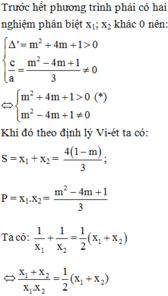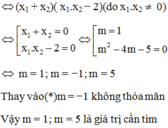tìm m để phương trình |x2-4|x|x+3|=m-1 có 4 nghiệm phân biệt

Những câu hỏi liên quan
Bài 1 cho pt x^2-2(m+1)x+4m+m^2=0 .Tìm m để phương trình có 2 nghiệm phân biệt x1,x2 sao cho biểu thức A =|x1-x2| đạt giá trị nhỏ nhất
bài 2 cho pt x^2+mx+2m-4=0.Tìm m để phương trình có 2 nghiệm phân biệt x1,x2 thỏa mãn |x1|+|x2|=3
bài 3 cho pt x^2-3x-m^2+1=0.tìm m để phương trình có 2 nghiệm phân biệt x1,x2 thỏa mãn |x1|+2|x2|=3
Bài 4:Cho phương trình ẩn x: x2 - (m + 3)x + m = 0
a) Chứng minh rằng với mọi giá trị của m phương trình (1) luôn có 2 nghiệm phân biệt.
b) Tìm m để phương trình có 2 nghiệm Phân biệt x1, x2 thỏa mãn hệ thức:
x12 + x22 = 6
a) \(\Delta=\left[-\left(m+3\right)\right]^2-4.1.m\\ =m^2+6m+9-4m\\ =m^2+2m+9\\ =\left(m+1\right)^2+8>0\forall m\)
Vậy phương trình luôn có 2 nghiệm phân biệt với mọi m.
b) Áp dụng hệ thức Vi-et, ta có:
\(\left\{{}\begin{matrix}x_1+x_2=m+3\\x_1x_2=m\end{matrix}\right.\)
Mà \(x_1^2+x_2^2=6\)
\(\Leftrightarrow\left(x_1+x_2\right)^2-2x_1x_2=6\\ \Leftrightarrow\left(m+3\right)^2-2m=6\\ \Leftrightarrow m^2+6m+9-2m=6\\ \Leftrightarrow m^2+4m+3=0\\ \Leftrightarrow\left(m+1\right)\left(m+3\right)=0\\ \Leftrightarrow\left[{}\begin{matrix}m=-1\\m=-3\end{matrix}\right.\)
Vậy \(m\in\left\{-1;-3\right\}\) là các giá trị cần tìm.
Đúng 1
Bình luận (0)
a, Ta có: \(\Delta=\left[-\left(m+3\right)\right]^2-4.1.m\)
\(=m^2+6m+9-4m\)
\(=m^2+2m+9\)
\(=m^2+2m+1+8\)
\(=\left(m+1\right)^2+8\)
Lại có: \(\left(m+1\right)^2\ge0\forall m\Rightarrow\left(m+1\right)^2+8\ge8\forall m\)
Vậy phương trình luôn có 2 nghiêm phân biệt
b, Theo hệ thức Vi-ét: \(\left\{{}\begin{matrix}x_1+x_2=m+3\\x_1+x_2=m\end{matrix}\right.\)
Theo bài ra:
\(x_1^2+x_2^2=6\)
\(\Leftrightarrow\left(x_1+x_2\right)^2-2x_1x_2=6\)
\(\Leftrightarrow\left(m+3\right)^2-2m=6\)
\(\Leftrightarrow m^2+6m+9-2m=6\)
\(\Leftrightarrow m^2+6m+9-2m-6=0\)
\(\Leftrightarrow m^2+4m+3=0\)
\(\Leftrightarrow m^2+m+3m+3=0\)
\(\Leftrightarrow\left(m^2+m\right)+\left(3m+3\right)=0\)
\(\Leftrightarrow m\left(m+1\right)+3\left(m+1\right)=0\)
\(\Leftrightarrow\left(m+1\right)\left(m+3\right)=0\)
\(\Leftrightarrow\left[{}\begin{matrix}m+1=0\\m+3=0\end{matrix}\right.\)
\(\Leftrightarrow\left[{}\begin{matrix}m=-1\\m=-3\end{matrix}\right.\)
Vậy với m=-1 hoặc m=-3 thì phương trinh trên thỏa mãn hệ thức
Đúng 1
Bình luận (0)
Cho phương trình: x2 - (m+3)x + m - 1 = 0 ( ẩn x, tham số m). Tìm m để phương trình có 2 nghiệm phân biệt x1; x2 sao cho x1 < \(\dfrac{-1}{4}\) < x2
\(\Delta=\left(m+3\right)^2-4\left(m-1\right)=\left(m+1\right)^2+12>0;\forall m\)
\(\Rightarrow\) Pt luôn có 2 nghiệm pb
Theo hệ thức Viet: \(\left\{{}\begin{matrix}x_1+x_2=m+3\\x_1x_2=m-1\end{matrix}\right.\)
\(x_1< -\dfrac{1}{4}< x_2\Leftrightarrow\left(x_1+\dfrac{1}{4}\right)\left(x_2+\dfrac{1}{4}\right)< 0\)
\(\Leftrightarrow x_1x_2+\dfrac{1}{4}\left(x_1+x_2\right)+\dfrac{1}{16}< 0\)
\(\Leftrightarrow m-1+\dfrac{1}{4}\left(m+3\right)+\dfrac{1}{16}< 0\)
\(\Leftrightarrow20m-3< 0\Rightarrow m< \dfrac{3}{20}\)
Đúng 0
Bình luận (0)
Cho phương trình: \(x^2\) - (2m+3)x - 2m - 4 = 0 (m là tham số).
a) Tìm m để phương trình có 2 nghiệm phân biệt.
b) Tìm m phương trình có 2 nghiệm phân biệt x1, x2 thỏa mãn |x1| + |x2| = 5
a)PT có 2 nghiệm phân biệt
`<=>Delta>0`
`<=>(2m+3)^2+4(2m+4)>0`
`<=>4m^2+12m+9+8m+16>0`
`<=>4m^2+20m+25>0`
`<=>(2m+5)^2>0`
`<=>m ne -5/2`
b)Áp dụng vi-ét:
$\begin{cases}x_1+x_2=2m+3\\x_1.x_2=-2m-4\\\end{cases}$
`|x_1|+|x_2|=5`
`<=>x_1^2+x_2^2+2|x_1.x_2|=25`
`<=>(x_1+x_2)^2+2(|x_1.x_2|-x_1.x_2)=25`
`<=>(2m+3)^2+2[|-2m-4|-(-2m-4)]=25`
Với `-2m-4>=0<=>m<=-2`
`=>pt<=>(2m+3)^2-25=0`
`<=>(2m-2)(2m+8)=0`
`<=>(m-1)(m+4)=0`
`<=>` $\left[ \begin{array}{l}x=1\\x=-4\end{array} \right.$
`-2m-4<=0=>m>=-2=>|-2m-4|=2m+4`
`<=>4m^2+12m+9+8m+16=25`
`<=>4m^2+20m=0`
`<=>m^2+5m=0`
`<=>` \left[ \begin{array}{l}x=0\\x=-5\end{array} \right.$
Vậy `m in {0,1,-4,-5}`
Đúng 2
Bình luận (0)
Cho phương trình: x^2 - mx + 2m - 4 0 (1) (với là ẩn, mlà tham số).a) Tìm m để phương trình có nghiệm x 3. Tìm nghiệm còn lại.b) Tìm m để phương trình (1) có hai nghiệm phân biệt x1; x2 thoả mãn: x^2_1 + mx_2 12.
Đọc tiếp
Cho phương trình: \(x^2\) - mx + 2m - 4 =0 (1) (với là ẩn, mlà tham số).
a) Tìm m để phương trình có nghiệm x = 3. Tìm nghiệm còn lại.
b) Tìm m để phương trình (1) có hai nghiệm phân biệt x1; x2 thoả mãn: \(x^2_1\) + m\(x_2\) = 12.
a) \(x^2-mx+2m-4=0\) nhận \(x=3\) là nghiệm nên:
\(3^2-m.3+2m-4=0\)
\(\Leftrightarrow9-3m+2m-4=0\)
\(\Leftrightarrow m-5=0\)
\(\Leftrightarrow m=5\)
Vậy phương trình trở thành: \(x^2-5x+6=0\) nhận x=3 là nghiệm vậy nghiệm còn lại là:
\(\Delta=\left(-5\right)^2-4.1.6=1\)
\(\Rightarrow\left\{{}\begin{matrix}x_1=\dfrac{-b+\sqrt{\Delta}}{2a}=\dfrac{-\left(-5\right)+\sqrt{1}}{2.1}=3\\x_2=\dfrac{-b-\sqrt{\Delta}}{2a}=\dfrac{-\left(-5\right)-\sqrt{1}}{2.1}=2\end{matrix}\right.\)
Vậy nghiệm còn lại là \(x=2\)
Đúng 1
Bình luận (0)
Cho phương trình : x2 - (m + 4)x + 4m = 0
a/ Tìm m để phương trình có một nghiệm là 2 . Tìm nghiệm còn lại của phương trình .
b/ Tìm m để phương trình đã cho có 2 nghiệm phân biệt x1, x2 thỏa mãn :
x12 + (m + 4)x2 = 16
\(x^2-\left(m+4\right)x+4m=0\) (1)
a)Thay x=2 vào pt (1) ta được: \(4-\left(m+4\right).2+4m=0\) \(\Leftrightarrow m=2\)
Thay m=2 vào pt (1) ta được: \(x^2-6x+8=0\)\(\Leftrightarrow x^2-4x-2x+8=0\)
\(\Leftrightarrow\left(x-4\right)\left(x-2\right)=0\)\(\Leftrightarrow\left[{}\begin{matrix}x=2\\x=4\end{matrix}\right.\)
Vậy nghiệm còn lại là 4
b)Để pt có hai nghiệm pb \(\Leftrightarrow\Delta>0\Leftrightarrow m^2-8m+16>0\)\(\Leftrightarrow\left(m-4\right)^2>0\)\(\Leftrightarrow m\ne4\)
Do x1 là một nghiệm của pt \(\Rightarrow x_1^2-\left(m+4\right)x_1+4m=0\)
\(\Rightarrow x_1^2=\left(m+4\right)x_1-4m=0\)
Theo viet có: \(x_1+x_2=m+4\)
\(x_1^2+\left(m+4\right)x_2=16\)
\(\Leftrightarrow\left(m+4\right)x_1-4m+\left(m+4\right)x_2=16\)
\(\Leftrightarrow\left(m+4\right)\left(x_1+x_2\right)-4m-16=0\)
\(\Leftrightarrow\left(m+4\right)^2-4m-16=0\)
\(\Leftrightarrow m^2+4m=0\)
\(\Leftrightarrow\left[{}\begin{matrix}m=0\\m=-4\end{matrix}\right.\)(Thỏa)
Vậy...
Đúng 2
Bình luận (1)
Cho phương trình \(\left(m-10\right)x^2-4mx+m-4=0\)
a) Tìm m để phương trình có nghiệm
b) Tìm m để phương trình có hai nghiệm phân biệt đều dương
c) Tìm m để phương trình có hai nghiệm x1; x2 sao cho \(\dfrac{1}{x_1}+\dfrac{1}{x^2}>1\)
Trường hợp 1: m=10
Phương trình sẽ là -40x+6=0
hay x=3/20
=>m=10 sẽ thỏa mãn trường hợp a
Trường hợp 2: m<>10
\(\Delta=\left(-4m\right)^2-4\left(m-10\right)\left(m-4\right)\)
\(=16m^2-4\left(m^2-14m+40\right)\)
\(=16m^2-4m^2+56m-160\)
\(=12m^2+56m-160\)
\(=4\left(3m^2+14m-40\right)\)
\(=4\left(3m^2-6m+20m-40\right)\)
\(=4\left(m-2\right)\left(3m+20\right)\)
a: Để phương trình có nghiệm thì (m-2)(3m+20)>=0
=>m>=2 hoặc m<=-20/3
b: Để phương trình có hai nghiệm phân biệt đều dương thì
\(\left\{{}\begin{matrix}\left(m-2\right)\left(3m+20\right)>0\\\dfrac{4m}{m-10}>0\\\dfrac{m-4}{m-10}>0\end{matrix}\right.\Rightarrow\left\{{}\begin{matrix}\left(m-2\right)\left(3m+20\right)>0\\m\in\left(-\infty;0\right)\cup\left(10;+\infty\right)\\m\in\left(-\infty;4\right)\cup\left(10;+\infty\right)\end{matrix}\right.\)
\(\Leftrightarrow m\in\left(-\infty;-\dfrac{20}{3}\right)\cup\left(10;+\infty\right)\)
Đúng 1
Bình luận (0)
Tìm m để phương trình 3
x
2
+ 4(m – 1)x +
m
2
– 4m + 1 0 có hai nghiệm phân biệt
x
1
;
x
2
thỏa mãn:
1
x
1
+
1
x
2
2
x...
Đọc tiếp
Tìm m để phương trình 3 x 2 + 4(m – 1)x + m 2 – 4m + 1 = 0 có hai nghiệm phân biệt x 1 ; x 2 thỏa mãn: 1 x 1 + 1 x 2 = 2 x 1 + x 2
A. m = 1; m = 5
B. m = 1; m = −1
C. m = 5
D. m ≠ 1
cho phương trình : x^2 - mx + m - 1 = 0
Tìm m để phương trình có 2 nghiệm phân biệt x1, x2 thỏa mãn |x1| + |x2| = 4
Ta có: \(\Delta\) = m2 - 4(m - 1) = m2 - 4m + 4 = (m - 2)2 \(\ge\) 0
\(\Rightarrow\) x1 = \(\dfrac{m-\left(m-2\right)}{2}=1\); x2 = \(\dfrac{m+m-2}{2}=m-1\)
Ta có: |x1| + |x2| = 4
\(\Leftrightarrow\) 1 + |m - 1| = 4
\(\Leftrightarrow\) |m - 1| = 3
\(\Leftrightarrow\) \(\left[{}\begin{matrix}m-1=3\\m-1=-3\end{matrix}\right.\Leftrightarrow\left[{}\begin{matrix}m=4\\m=-2\end{matrix}\right.\)
Vậy ...
Chúc bn học tốt!
Đúng 0
Bình luận (0)
























